HEALTHCARE BUSINESS TODAY — Specialty and subspecialty healthcare services are less likely to be available in rural areas and are less likely to include highly sophisticated or high-intensity care. This exacerbates problems for rural patients seeking specialized care who must travel significant distances for treatment.
It comes as no surprise a 2019 policy brief from the University of Minnesota Rural Health Research Center found that 64% of surveyed rural health clinic staff members reported difficulties finding specialists for patient referral.
A functioning rural health system relies on legions of specialty care doctors doing outreach visits across a wide geography. In theory, that’s an effective way to ensure that rural patients have access to specialty care without traveling to a major metro area. But, bad data is keeping us from achieving complete access to specialty care in rural areas and experts across industries are weighing in on the issue.
Progress in healthcare data quality
Health tech companies have attempted to solve provider data inaccuracy problems with a number of products, platforms, and integrations. No solutions have been able to offer members the ability to easily book an appointment armed with accurate information.
While many solutions focus on gathering all data sources available to identify providers, most don’t have the ability to effectively clean up those databases. That’s where we comes in. Veda is leading efforts to eradicate rural healthcare data challenges in the U.S. Discover how our technology connects patients to the critical care they need while ensuring that individuals are not burdened with unexpected healthcare costs.



